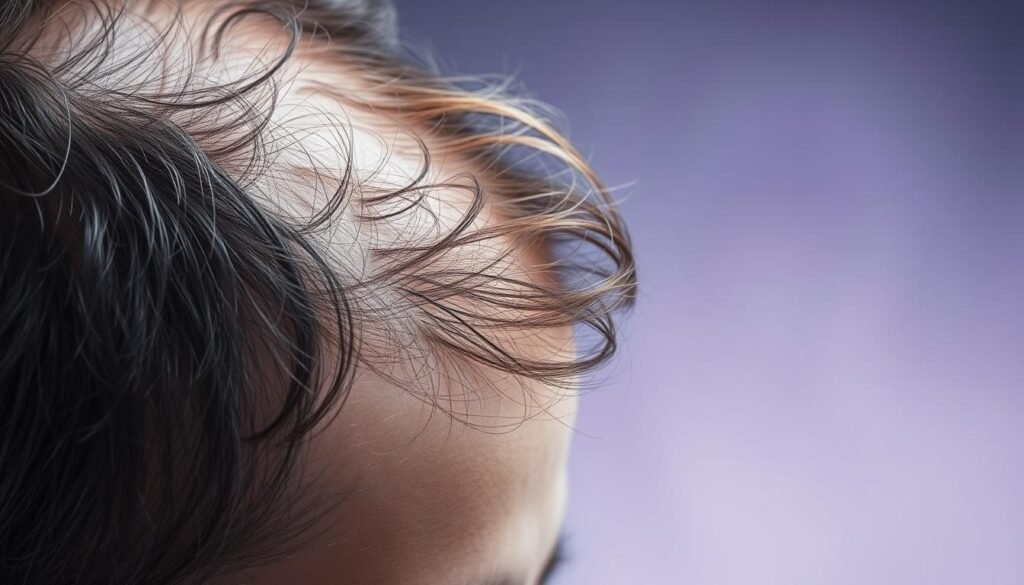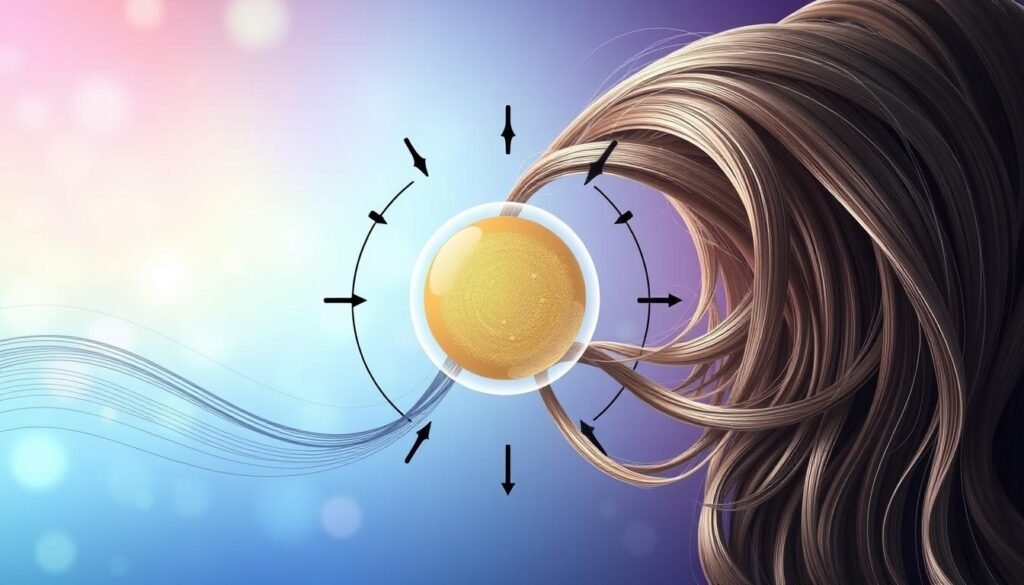Did you know close to 21 million women in the US struggle with hair loss? This has a big effect on their self-esteem. Around 50% of adults might experience pattern hair loss by age 50. This shows how important it is to understand the link between stress and hair loss. In our busy lives, chronic stress isn’t just a mental problem. It can also cause physical problems, like hair loss.
This article looks closely at how stress affects our hair. It encourages readers to learn more about this topic. By knowing what causes this issue, we can talk openly about our health. And we can take steps to manage our stress. This could help protect our hair. Let’s find out how stress is closely linked to the health of our hair.
Key Takeaways
- Stress can significantly impact hair health, contributing to conditions like alopecia and pattern hair loss.
- Approximately 21 million women face the challenge of hair loss in the U.S.
- Both hormonal imbalances and nutritional deficiencies may worsen hair loss concerns.
- Understanding the relationship between stress and hair loss is key for effective management.
- Taking active steps can help lessen the bad effects of stress on hair health.
Understanding Hair Loss: The Types and Triggers
Hair loss comes from many sources and has several types. Knowing the types can help find the best treatments. It’s also key to understand what triggers hair loss. This knowledge greatly affects hair health.
Types of Hair Loss
Different kinds of hair loss exhibit unique features:
- Telogen Effluvium: This is stress-related hair loss that leads to thinning after stressful events. It happens when hair fibres rest too soon.
- Alopecia Areata: This autoimmune disorder, often stress-related, causes patchy hair loss. The immune system mistakenly attacks hair follicles, affecting around 6.7 million U.S. citizens.
- Androgenetic Alopecia: Also called pattern baldness, this hereditary condition affects many. By age 50, 50% of men face it, jumping to 80% by age 80. Women experience it in a milder form.
Common Triggers of Hair Loss
Many factors can trigger hair loss, including:
- Emotional stress from work or personal issues
- Physical stress due to illness or surgery
- Major life changes like a new job, losing someone, or pregnancy
The link between hair loss triggers and biological factors shows how complex hair health is.
The Science Behind Stress-Induced Hair Loss
Stress affects our bodies in many ways, including our hair health. Hormonal imbalances and less blood flow play big roles. Both can harm hair growth and health.
Hormonal Imbalances
Stress leads to more cortisol, a hormone. This shift can stop hair from growing normally. Normally, a little hair is resting, but stress might stop half of it from growing. It’s key to manage these hormone levels to fight hair loss from stress.
Reduced Blood Flow
Stress can make it hard for blood to flow well. This means not enough nutrients and oxygen reach the hair. Good blood flow helps keep the scalp and hair healthy. Fixing blood flow can help hair begin to grow back after loss.

Learning more about stress-induced hair loss is important. Knowing how stress changes blood flow and hormones helps. With this knowledge, people can work on getting their hair healthy again.
| Impact of Stress on Hair Health | Normal Phase (Without Stress) | Stress-induced Phase |
|---|---|---|
| Hair Follicles in Telogen Phase | Approximately 10% | Up to 50% |
| Duration of Shedding (Typical) | Varies | Can last over 6 months |
| Regrowth Time After Stressor Removal | Varies | 3-6 months |
| Major Trigger Factors | N/A | Severe stress, hormonal changes, nutritional deficiencies |
Exploring the Role of Cortisol in Hair Loss
Cortisol is known as the stress hormone. It is very important for many body functions. Cortisol affects our hair’s health a lot, especially when it stays high for a long time.
Effects of High Cortisol Levels
High levels of cortisol do more than just make us feel stressed. When cortisol stays high, it can mess with our hormones. This can affect our thyroid and reproductive hormones.
This may cause anxiety and depression. Chronic stress can make it hard for our hair to grow. It can even lead to hair loss conditions like telogen effluvium and alopecia areata. It also makes it hard for our body to get the nutrients it needs for healthy hair.
How Cortisol Affects the Hair Cycle
There’s a clear link between cortisol and losing hair. High cortisol can mess up the hair growth cycle. It messes with the cells that keep hair follicles healthy.
As cortisol goes up, it can stop our hair from growing. Studies show that too much cortisol can cause inflammation. That can really slow down hair growth.

| Condition | Impact of High Cortisol |
|---|---|
| Telogen Effluvium | Increases hair shedding and thinning due to premature transition of hair follicles into the resting phase. |
| Alopecia Areata | Can trigger sudden hair loss in patches when the immune system mistakenly attacks hair follicles due to stress. |
| Trichotillomania | Psychological condition resulting in hair pulling; often linked to stress and feelings of anxiety or frustration. |
Is Stress the Only Culprit?
Stress plays a big part in hair loss, but it’s not the only cause. Many factors can lead to this problem. Among these are a person’s genes and what they eat.
Genetics and Hair Loss
Genes have a big effect on hair loss. If your family has a history of conditions like alopecia areata, you might be more prone to losing hair. Stress can make this worse. Knowing your family history helps in understanding and treating hair loss.
The Impact of Nutrition
Nutritional deficiencies also play a role in hair loss. Not getting enough biotin, vitamin D, or iron can harm your hair. Stress can lead to bad eating habits, making nutrition worse. A balanced diet is key for healthy hair.
| Essential Nutrients | Role in Hair Health | Sources |
|---|---|---|
| Biotin | Helps strengthen hair | Eggs, nuts, whole grains |
| Vitamin D | Stimulates hair follicle growth | Fatty fish, mushrooms, fortified foods |
| Iron | Supports blood circulation to hair follicles | Red meat, spinach, lentils |
To make good hair care choices, understanding these factors is important. For more on stress and heart issues, click here.
Strategies for Stress Management
Keeping stress under control is key to healthy hair. By applying different stress management methods, people can improve their overall health. This also creates a good setting for hair to grow. Here are some good strategies to try:
Exercise and Physical Activity
Regular exercise for stress relief is very important for mental health. It makes you feel better by increasing endorphins and reduces stress. Exercising also pumps more blood to your scalp, which is great for your hair. Try walking, running, or yoga for starters.
Meditation and Mindfulness
Mindfulness practices, like meditation, can really cut down on stress hormones. These hormones can even cause hair loss. Spending time on mindfulness makes you more relaxed and emotionally strong. This good for your mood and your hair too.
Cognitive Behavioral Therapy (CBT)
Talking to a therapist helps with stress. Cognitive Behavioral Therapy changes the bad thoughts that cause stress. This therapy helps control your emotions. Lowering stress this way also helps keep your hair healthy.

| Strategy | Benefits | Activities |
|---|---|---|
| Exercise | Boosts endorphin production, improves blood circulation | Walking, running, yoga |
| Meditation | Reduces cortisol levels, enhances emotional well-being | Mindfulness meditation, guided meditation |
| CBT | Improves emotional regulation, develops coping strategies | Therapeutic sessions, journaling |
The Path to Regrowth: Combatting Hair Loss
Dealing with hair loss requires a comprehensive approach. Using proven methods can lead to thicker, healthier hair. People with thinning hair should look into different solutions that fit them.
Consider a Women’s Hair Regrowth Kit
Many women find a hair regrowth kit helpful in their fight against hair loss. These kits often have key ingredients like minoxidil, which boosts hair growth. They also include biotin to help with follicle health. Choosing a complete kit can significantly improve hair thickness and growth.
Consulting a Professional
Talking to a professional can uncover hidden reasons for hair loss. Dermatologists and health experts create personalized treatment plans. It’s important to find out what is causing the hair loss, like stress, genetics, or diet issues. There are many treatments available, from topical solutions and diet changes to lifestyle adjustments, detailed in resources like this guide.
Building a Healthy Hair Care Routine
Creating a good hair care routine is key to getting healthy hair. It’s important to treat your hair with care to keep it strong and growing.
Gentle Hair Care Practices
Gentle hair care helps avoid damage and keeps hair healthy. Here’s what you can do:
- Use sulfate-free shampoos to cleanse without stripping natural oils.
- Avoid harsh treatments and excessive heat styling to preserve hair integrity.
- Incorporate regular trims every 2-3 months to maintain a healthy look and prevent split ends.
- Consider a gentle scalp exfoliation at least once a week to stimulate circulation and promote growth.
- Embrace hair-friendly accessories, such as silk scrunchies, to reduce breakage.
A Holistic Approach to Hair Health
Adding holistic practices to your routine can improve your hair health. This includes:
- Adopting balanced nutrition by focusing on vitamins and minerals crucial for hair health.
- Incorporating stress-relief activities, such as yoga and mindfulness exercises, which can enhance overall well-being and reflect positively on hair condition.
- Using effective hair care products, like Oribe’s Gold Lust Oil and The Ordinary Multi-Peptide Serum, designed to nourish and strengthen hair.
Knowing about different hair types and how to care for them is beneficial. For example, straight hair might need a wash every 2-3 days. Wavy hair does well with a wash every 3-4 days. Curly and coily hair types have their own moisture needs and washing schedules.
| Hair Type | Washing Frequency |
|---|---|
| Straight | Every 2-3 Days |
| Wavy | Every 3-4 Days |
| Curly | Once a Week |
| Coily | Co-wash Every 2-3 Days |
By following a routine that suits your hair type and includes gentle care, you can have healthier hair. This personalized approach will help in maintaining your hair’s health and appearance.
Never Miss a Beat! Stay Informed on Hair Health
It’s important for anyone who wants to keep their hair thick to stay informed about hair health. New studies always show more about how stress, health, and losing hair are connected. By following the newest research, you can take good care of your hair based on solid information.
Keeping Up with Latest Research
Understanding new studies can really help you get a grip on what causes hair loss and how to deal with it. Public figures’ stories show many reasons for hair loss, like stress and what you eat. For example, Mika Brzezinski managed to get her hair to grow back by eating better and reducing stress. A detailed guide on keeping your hair can offer helpful advice.
Empowering Yourself Through Knowledge
By learning how stress affects your hair, you can start looking after your well-being better. Noticing when your hair starts falling out and knowing why lets you tackle the issue early. Looking into resources like the different kinds of hair loss explained here gives you tools for stronger, healthier hair.